
GMS Members Present at AIM Sync
GMS Members Present at AIM Sync
On Tuesday, April 8th 2025, GMS members joined the Association of Independent Music for AIM Sync, the UK’s leading global online sync licensing conference. Various members of the GMS Board featured on panels, including a strong showing from our D&I Committee.
An opening ‘State of the Nation’ panel moderated by Pam Lewis-Rudden (Plutonic Group Syncs) alluded to nascent sync DSP platforms designed to ease the music licensing process for commercial music. Independent supervisor Jumi Akinfenwa sees these platforms’ potential to add “another string to the bow of music searches”, but cautioned anyone against putting all their eggs in one basket.
Later, a panel moderated by Zoë Ellen Bryant (Carbon Logic) examined misunderstandings that music supervisors, sync agents and creative licensing reps have to overcome. As part of the discussion, the importance of constantly re-educating producers was touched on as an important step towards upholding creativity as a music supervisor. Kadambari Chauhan (Redfive Creative) emphasised the importance of collaboration in the role:
“It’s not just about your creativity, it’s about the creativity of the people that you brief out to (record labels, publishers, sync agents etc.) because sync is a collaborative process. Look at the creative process as mining collective minds rather than putting your own personal stamp on a show. You’re one part of different moving pieces that contribute towards a bigger picture. Your passion should be not only for the job, but for the industry as well – and how everybody brings something together. Care about that and not just your particular job description – would be my top piece of advice.”
The day ended with a keynote from Matt Biffa (Air-Edel), who went into interesting depth and entertaining details about the creative process behind some of his favourite projects. This included stories of working with Jarvis Cocker for Harry Potter and the Goblet of Fire, building character playlists for One Day, and phoning rightsholders to forewarn them about the graphic briefs he sent through for Sex Education. Matt concluded by reflecting that “success for me was always just looking forward to work on a Monday.”
Congratulations to Frederic Schindler (Too Young Ltd. & Catalog) for winning AIM Music Supervisor of the Year and to Just Isn’t Music & Ninja Tune for achieving Independent Sync of the Year. Special recognition was also given to Anjunabeats. GMS member Leo Niemi also gave a compelling market overview on Finland, discussing the different practices in the Finnish sync industry, production music rules, AV and publishing.
Thank you to the Association of Independent Music for inviting us to partner with them on this event and to all GMS members who attended and took part.
Written by David Simkins (he/him), GMS D&I Committee
Pictured: Jumi Akinfenwa and Kadambari Chauhan
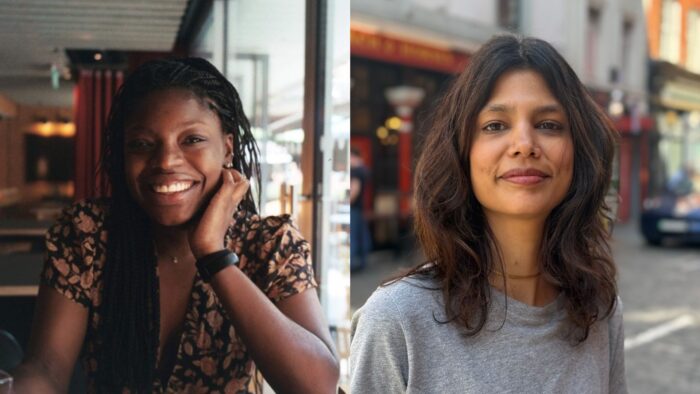
GMS 2025 Board Nominations: Now Open
Nominations for our upcoming Board elections are open!

We are excited to announce that the UK & European Guild of Music Supervisors (GMS) will be electing a new Board in 2025!
Nominations are now officially open, and this is your opportunity to step into a leadership role within our growing community.
📈 A Year of Growth
The past year has been a busy year for GMS in the UK and Europe with Masterclasses, social events and a new initiative for European expansion and outreach. We’ve welcomed new members, launched new member resources, partnerships and discounts, brought our community together through educational programming both online and in-person.
Now, we’re expanding our leadership—welcoming new members to both the Senior Board and Full Working Board—and we want you to be part of it.
🗓️ Key Election Dates
April 15: Nominations open
May 11: Final day to submit nominations (deadline at 11.59 PM)
May 19: Voting begins
May 30: Voting closes
By June 1: New Board Members announced
🧭 How the Board Works
Senior Board
8 Seats, including President & Vice President
Provides strategic leadership on all Guild matters (Constitution, Membership, Finance, Partnerships)
- Members attend monthly meetings and contribute actively between sessions.
- Officers (President & Vice President) serve 2-year terms
- All Senior Board members also sit on the Full Working Board
Full Working Board
Supports the Guild’s grassroots efforts and subcommittees, as well as helping with member engagement and educational programming.
Members attend quarterly meetings and contribute to GMS initiatives between sessions
Composition of the Full Working Board
- 8 Senior Board members (including Officers)
- 10 elected Full Working Board members
- 2 European Full Working Members who are selected in closed selection
- In total: 10 Full Supervisors and 2 Associate Members besides the Senior Board.
✅ Eligibility
In order to become a Senior Board Member, the applicants have to be previous Full Working Board members.
All GMS music supervisor members (Full, Associate, and Provisional) are eligible to vote in the 2025 elections
How to self- nominate for the Full Working Board or Senior Board (including Officer roles)
To be considered for a position, members must:
Submit a nomination form with a brief statement of interest and commitment to GMS work
- Be willing to actively participate over a 2-year term
- Have capacity to contribute time, dedication and energy between meetings
- Be an active GMS Full Music Supervisor or Associate member
Whether you’re passionate about community, education, industry advocacy, or simply want to give back to the GMS network, we want to hear from you.
🗳️ Nominations close on May 11
📬 Voting instructions will be sent via email to all eligible members
🖥️ Voting will be conducted via a secure third-party platform
➡️ Submit your nomination here.
GMS Awards in the US

We are thrilled to announce that numerous members of the UK & European Guild of Music Supervisors have been honoured with nominations for the 15th Annual Guild of Music Supervisors Awards, scheduled for February 23, 2025, at The Wiltern Theatre in Los Angeles. These esteemed awards are hosted by the American GMS annually, giving great visibility to the wonderful work of music supervisors in our industry.
Here are some European Guild members and other nominees:
- Maggie Rodford: Nominated for Best Music Supervision in a Major Budget Film for her exceptional work on Wicked.
- Iain Cooke: Recognized in the Best Music Supervision in a Mid-Level Budget Film category for Back to Black.
- James A. Taylor: Nominated for Best Music Supervision in a Low Budget Film for The Brutalist.
- Matt Biffa: Honored with a nomination for Best Music Supervision in a Television Drama for One Day.
- Catherine Grieves: Nominated in the same category for her work on Baby Reindeer.
- Gary Welch: Recognized for Best Music Supervision in a Docuseries for Camden.
- Ollie White: Nominated for Best Song Written and/or Recorded for Television for “Do You See Me Now” in Sweetpea.
- Codie Childs: Honored in the Best Music Supervision in Advertising (Long-Form) category for PS5 | Play Has No Limits.
- Connie Edwards and Sunny Kapoor: Nominated in the same advertising category for Spot it Early.
- Will Quiney: Recognized for Best Music Supervision in a Trailer (Film) for Cuckoo.
- Codie Childs and James Marshall: Nominated for Best Music Supervision in a Video Game (Original Music) for LEGO Horizon Adventures (Composer: Homay Schmitz) and Until Dawn (Composer: Mark Korven).
- Glenn Herweijer and Ben Sumner: Honored in the same video game category for Life is Strange: Double Exposure (Composers: Glenn Herweijer, Nick Hill, Tessa Rose Jackson, Luciano Rossi).
These nominations highlight the exceptional talent and dedication within our community. We extend our heartfelt congratulations to all our nominated members for their remarkable achievements and wish them the very best at the upcoming awards ceremony.
The Guild of Music Supervisors Awards celebrates excellence across various media, including film, television, games, advertising, and trailers. This year’s ceremony will also feature special mentions, with “Wicked” composer and lyricist Stephen Schwartz receiving the Icon Award, and music supervisor Bonnie Greenberg being bestowed with the Legacy Award.
For a complete list of nominees and more details about the awards, please visit the official Awards website here.
We take immense pride in the accomplishments of our members and their significant contributions the industry, which inspire and elevate the standards of music supervision.
Note: The information regarding the nominations was sourced from the Guild of Music Supervisors’ official announcements.
Interview: 515’s Hollie Hutton on music-first commissioning for underrepresented gender composers
This month, we spoke with Hollie Hutton (she/her), Co-Founder and Creative Director of the award-winning music supervision agency RESISTER and its sister composer agency 515, the dedicated home for women and gender minority composers.
In this interview, Hollie challenges music and advertising agencies to be fully transparent about the composers they’re working with and to commission composers based on their music, not just their credits.
Pictured: Hollie Hutton (sher/her), Executive Creative Director / Co-Founder, RESISTER
Hey Hollie! First of all, tell us about how RESISTER and 515 came to be.
Hi! Hannah Charman and I set up RESISTER five years ago to resist the historical lack of women and underrepresented groups in music composition for all media.
From our experience of composer rosters at other agencies, we’d noticed that the majority of jobs were going to the same composers, and that most of these were male. But content creators were increasingly looking for women and other underrepresented composers to help tell specific stories and we didn’t see any composer agencies that focused on supporting and championing this talent. So we wanted to create a home where people can find that talent alongside continuing our work as music supervisors.
Our original aspiration was to have at least 50% of our pitches going out to women and gender minority composers. While this is how we started (the company was initially named SISTER), the more progress we made, the more our clients came to us specifically for this diverse talent pool and the more things we collectively wanted to resist. Rebranding to RESISTER in 2023 allowed us to expand our mission to resist more industry norms, from a lack of transparency when commissioning composers to a lack of crediting on won jobs..
So we lifted the hood and three years later, we have a talent pool of over 300 women, gender minority and underrepresented composers and have now signed nine of them exclusively to our 515 roster. Although 515 is the ‘SIS’ from RESISTER, we wanted to separate our composer agency from our music supervision brand. We didn’t just want to sit on 300 composers or limit them from working with competing supervisors. We believe the more credits and experience the composers can get, the more we can advance composer representation across the board.
So what barriers to composer representation is RESISTER resisting?
First of all, to understand the lack of representation, you have to be able to see who is getting the work. We tried to get stats from all composed ads last year, but only some of the composers have been credited. When agencies don’t credit their composers, we’re not even able to see how bad the problem is. There’s a real transparency issue in advertising.
But there are stats for Hollywood films, so I can tell you that when we started the company five years ago, only 7% of Hollywood film scores were composed by women. That’s peaked at 14% since. As for commercial music on the Billboard Hot 100, 2.6% was produced by women in 2019, and that went up to 6.5% by 2023 (only 0.9% women of colour).
Even though those stats have doubled in the last five years, there’s still a huge amount of work to do in film scores and commercial music. I have no doubt the advertising world is very similar.
Music and advertising agencies need to credit the composers they’re working with, because only then can they start to understand and address commissioning inclusively. The more transparent they are, the more we’ll see change.
There’s also an issue with the reel-first approach, where commissioners only give a composer a job if they can see that they’ve done the work before. Deadlines to deliver demos are very strenuous, so agencies are understandably reluctant to commission composers who have less experience turning something around quickly. So you find this circulation of amazingly experienced composers, but a lack of confidence to commission outside of them.
With that in mind, we listen to the music first, as opposed to reels, and try to include at least one new composer on each of our pitches. We’re also seeing more composers blind pitching for film and TV work, which really enables them to be valued based on the music they’ve created rather than just on their previous experience (which is important too). We love taking the creative approach of commissioning talent from a certain soundworld, because their authenticity and passion pushes the creative boundaries.
You mentioned ‘authenticity’. What role does this play in the commissioning of female and gender diverse composers?
Well, I’ve seen a big shift over the past five years where more content creators are looking for authenticity. So when there is a story about a person from a particular area or marginalised group, commissioners want to bring on composers who have that same story at their heart too.
On the last three TV shows that we’ve done, all of the music has been commissioned from artists local to where the show was set. Supporting regional talent brings authenticity to the sound, opportunity outside of the ‘London bubble’ and clout from a PR and storytelling perspective.
Five years ago, there was a flipside to this (which has started to improve) where we were being asked for female composers because it was a female-only creative, like a tampon ad. Whereas, the dark car ads or masculine action films weren’t considered something that a woman or nonbinary composer could score.
So there’s definitely a balance between being authentic with your community and limiting specific talent to specific stories. We don’t want to create a place where underrepresented genders are only getting opportunities to work on certain projects.
So tell us more about the 515 roster and their successful sync placements.
We launched 515 a year ago with six composers. We now have nine, so we’ve had some exciting additional signings, including Shelly McErlaine, who’s one half of Alisha’s Attic, for those of my generation who’ll know them.She just wrote the theme for the Pride of Britain Awards. It’s a beautiful, incredibly powerful theme, she’s an amazing talent.
Adina Nelu, one of our original 515, and Sarah Decourcy, a new signing based in LA, both did incredible re-records last year, Adina for Dove and Sarah for Magnum (working with Iggy Pop and Siouxsie Sioux). Both were finalists at the Music+Sound Awards. Sarah is very talented in the trailer world and was also the first female composer to score a Far Cry video game.
What makes 515 different is that we have a mixture of heritage composers and emerging talent. We take that music-first approach – we don’t sign the people with the most credits, we sign the people we believe in who have a unique voice.
For example, Nailah Hunter is an incredible harpist and artist based in LA who’s looking to do more score composing. Whereas, Akiko Haruna has more of an underground, electronic sound.
So we’ve cherry picked artists with a passion for a specific soundworld to ensure our composers don’t cross over sonically and to drive home their authenticity and specialism. That way, the roster also covers lots of different briefs.
How can our members find out more and get involved?
Music commissioners can think of 515 as a resource to find women and gender minority composers for their projects. Emily Richardson, our Head of 515 and composer agent, represents all the composers we’ve met and worked with. She doesn’t just pitch a composer because they’re part of 515, she pitches the right talent for the job.
For instance, we recently partnered with Wake The Town on the John Lewis Christmas campaign, representing composer and artist Laura Mvula who we’ve been working with on bespoke projects for the last two years.
So we’re very open to collaboration, both for anyone looking to commission our 515 roster, and as tastemakers for the community of women, and gender minority composers.
So come to us and ask, “Who might be good for this?” That’s a great place to start.
Hollie Hutton – Executive Creative Director / Co-Founder, RESISTER: hollie@resistermusic.com
Emily Richardson – Head of 515 / Senior Music Supervisor: emily@515talent.com
Interview by David Simkins (he/him), GMS D&I Committee
GMS Members Reunite at ADE: “Screen Soundtracks: The Power of Music Supervision”
Zoë Ellen Bryant (Carbon Logic), Oliver White (Theodore Music) and Iain Cooke (45RPM) spoke in a panel at Amsterdam Dance Event (ADE) in October.
The event was a part of ADE 2024 Pro conference, which features panels and discussions about the business behind electronic music, the future for electronic music and the world surrounding the music industry. Buma Music in Motion (BMIM) was one of the partners of the event and supported the curation.
Music has evolved from playing a minor background role in films and series to becoming a significant component in storytelling. A perfectly placed song or soundtrack can captivate audiences and define cultural moments. Especially with the power of platforms like TikTok. This transformation is largely due to the work of music supervisors, who meticulously craft these musical landscapes in collaboration with publishers, labels and other industry partners.
The discussion explored how music has shifted from a background element to a crucial part of storytelling in films and series. It highlighted the creative thinking required from music supervisors and the barriers they face.
One attendee who is a music producer based in Berlin shared their perspective on the session: “It was inspiring to hear from Zoë, Oliver, and Iain about the challenges and creativity involved in bringing music to life on screen. I hadn’t realised just how much thought and negotiation goes into placing one song—it’s not just about choosing a track that fits, but about creating a moment that can shape how people remember a scene.” The attendee added that hearing from seasoned professionals gave them “a new respect for the craft of music supervision” and the way it bridges the gap between artistry and audience engagement.
Events like this certainly highlight the complex but rewarding role that music supervisors play in shaping cultural moments. Our music supervisor members shared their process and emphasised the significant impact of music placement in trailers, games, TV series, movies and adverts. Their work not only enhances the viewing experience but also drives substantial revenue streams for the music that is used.
ADE Pro’s programme also covered panels that discussed the power of music during times of conflict and war, as well as market spotlights on Africa’s music industry, Masterclasses from Spotify and more.
Iain Cooke, Music Supervisor, 45 RPM
TikTok Music Closes Down
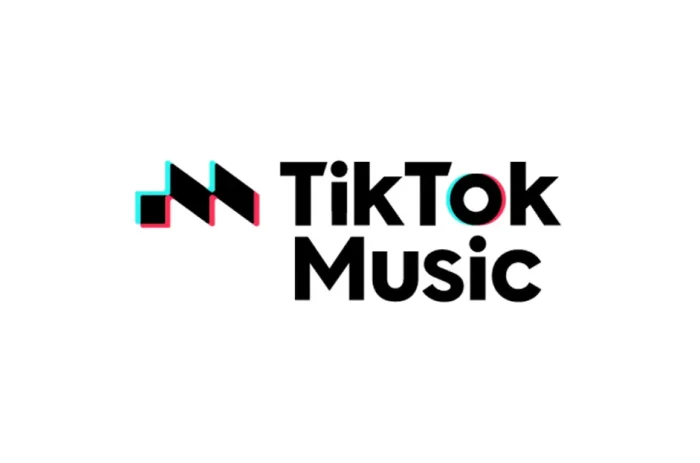
TikTok has announced it will be shutting down its music streaming service.
“We are sorry to inform you that TikTok Music will be closing on 28 November 2024,” stated a notice on the platform’s website.
Meanwhile, TikTok Music is advising users to transfer their playlists by 28 October and request refunds by 28 November.
Ole Obermann, global head of music business development at TikTok’s parent company ByteDance, issued a press statement explaining that the company plans to focus on collaborating with partner DSPs.
He said: “Our Add to Music App feature has already enabled hundreds of millions of track saves to playlists on partner music streaming services.
“We will be closing TikTok Music at the end of November in order to focus on our goal of furthering TikTok’s role in driving even greater music listening and value on music streaming services, for the benefit of artists, songwriters and the industry.”
Launched in 2023, the Add to Music App feature allowed users to save songs they discovered on TikTok to streaming platforms like Spotify.
TikTok’s music streaming loss is evidently Spotify’s gain, as the latter’s stock price recently hit a record high before finishing at what appears to be its largest-ever closing value.
Many outlets have since reported that Spotify stock (NYSE: SPOT) is riding higher than ever in the wake of TikTok Music’s closure announcement, to the tune of a record per-share price of $386.96.
GMS Diversity & Inclusion Newsletter – Ilā Kamalagharan Interview
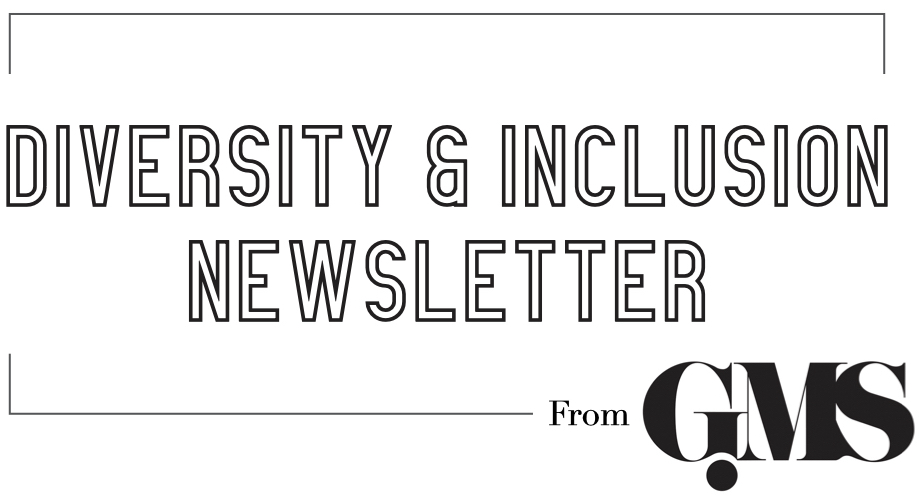
Pride Month Interview: ilā Kamalagharan
This month for our D&I newsletter interview, we spoke with ilā Kamalagharan, Trans+ artist, producer, vocalist, co-founder and director of London Contemporary Voices and Trans Voices, the UK’s first professional Trans+ choir. They are also the creative director of Maison Mercury Jones, the first sonic branding agency focused on a fair representation of all gender identities, underrepresented ethnicities, ages+ and dis/abilities in music & marketing for brands.
Read on to hear more about how they work to empower underrepresented composers and musicians.
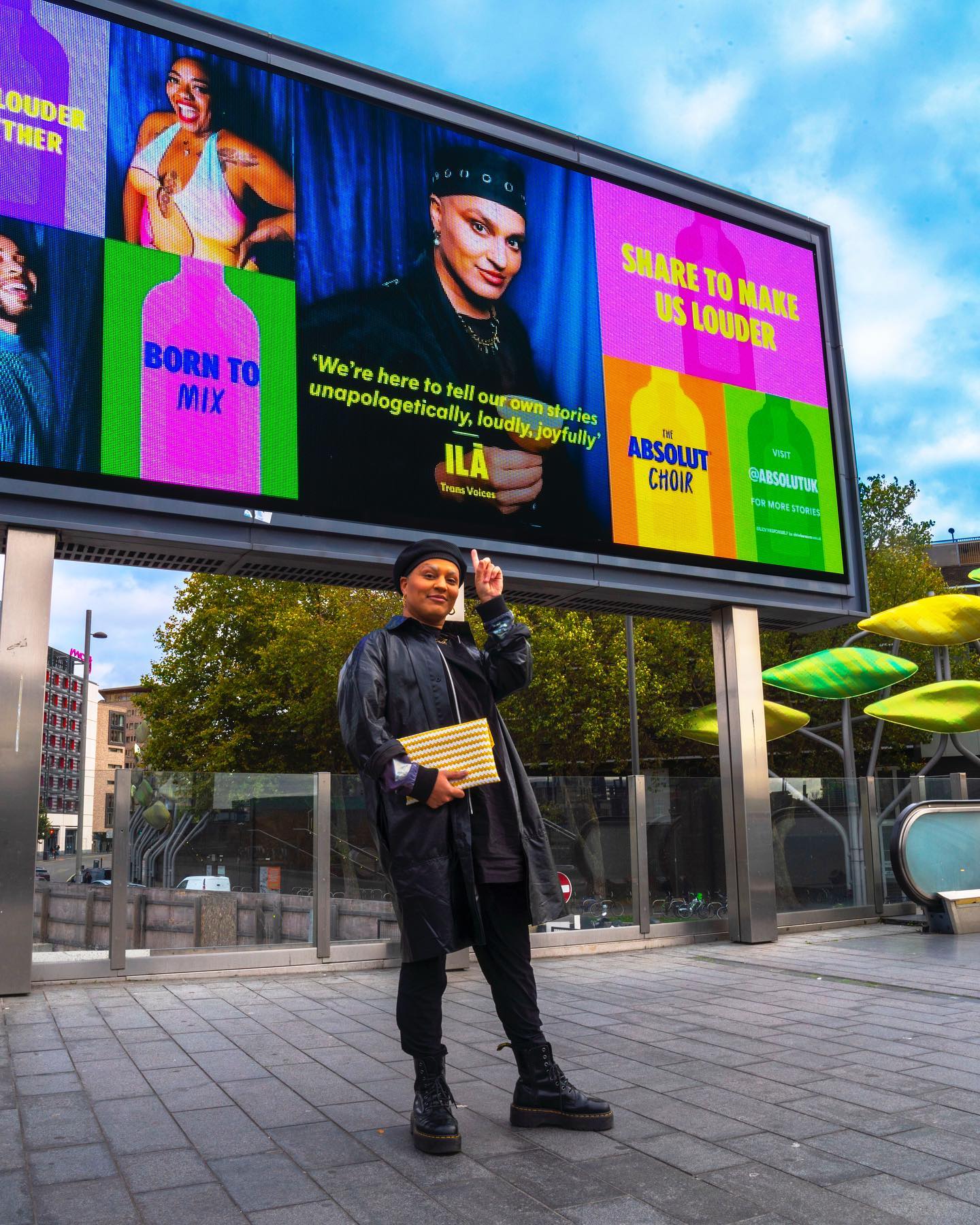
Tell us a bit about yourself and Maison Mercury Jones
We started the agency a year ago, and our mission is to work exclusively with composers from underrepresented groups and to do really exciting artistic collaborations with brands. The second prong of the agency is embracing new technologies, so all things Web3 as well. It’s a real founding belief of mine that the biggest paradigm shifts in music and culture have always come at the intersection of marginalised groups meeting and creating something new together, but also how that intersects with new technologies and possibilities within music tech.
So in embracing those two things, you arrive at a place where you’re going to make something that is unique, meaningful, powerful, but also helps represent those people who just don’t get a look in ordinarily in the world of music for brands, which is pretty impenetrable as an industry. It’s so exciting to me – we’ve already worked on campaigns for Absolut, created an anthem for Bosch UK’s 125 year anniversary, three TVCs for Havas and created the sound of planet Mercury for the European Space Agency’s BEPI Colombo Mission – and there’s so much more happening we can’t talk about yet.
We also have a research partnership with University of Sheffield, so as of this summer, I’ll be supervising a PhD student via Maison Mercury Jones in sonic branding and AI. So feeding into those new and emerging spaces but also very much embracing the intersection of new technology and diversity.
That’s very much where I’m at.
How do you think the digital future can be improved?
At the moment, there’s a lot of focus on fear, and rightly so, in terms of rights, ownership and permissions, but also on agency. It’s very valid but what I want to do is go into those places that are a bit scary and figure out what we want from them. Because there’s a lot of possibility there as well. The more that we embrace these new technologies, the more we can actually shape them and help influence policy and decision making on how they should be and how they should serve us rather than the other way around.
It means putting the composer at the centre. If they aren’t at the centre, I think a lot of things get developed that aren’t really all that useful [to them] but are just great for a quirky flash in the pan, viral moment. So, there’s a lot of work to do.
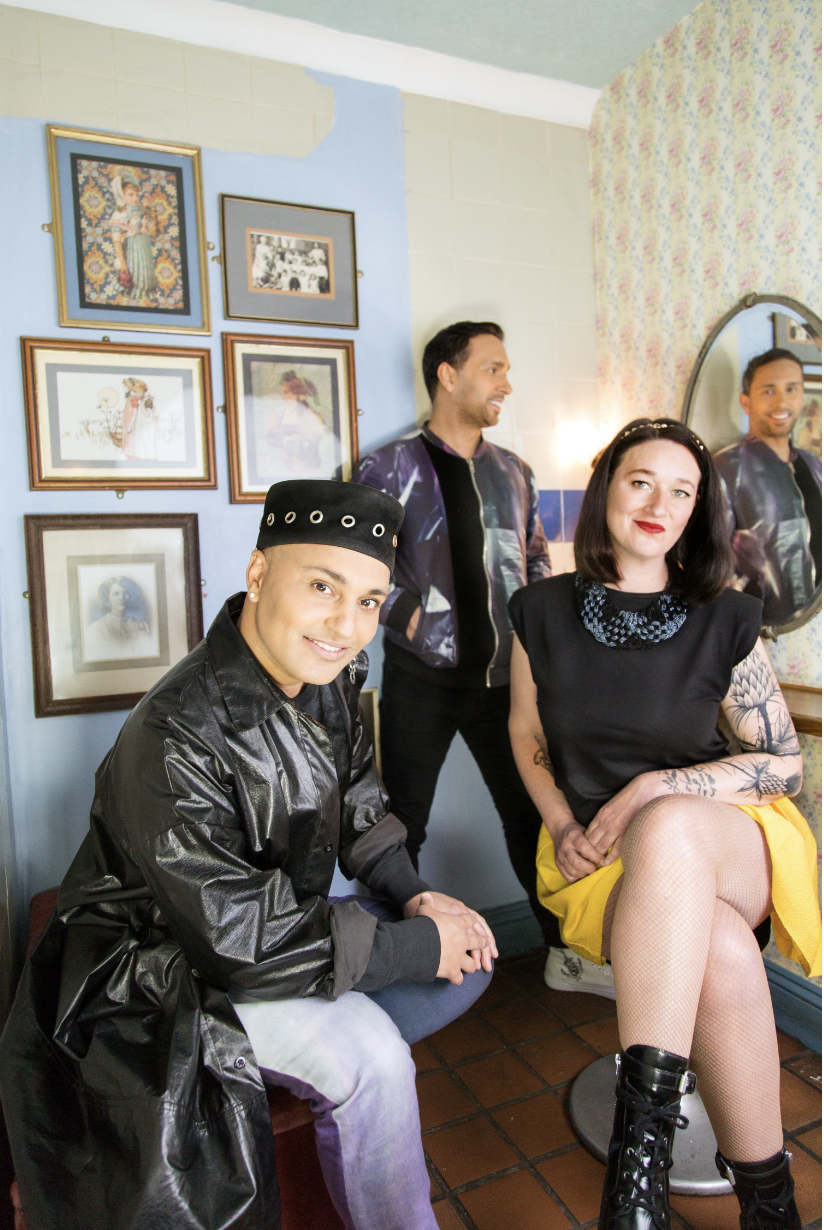
You’re the first creative agency that’s entirely Trans+, POC, LGBTQ+ and Female-led. Why was it important to not only work with marginalised identities, but also have this reflected in the leadership team?
We just are those people so I think it’s born out of frustration and a desire for things to be better. Between us we’ve worked in many other places and I feel that there’s quite an ingrained culture and implicit bias in terms of which composers people will work with. They’re all from the same background, and often in this small bubble. And therefore the music that’s created reflects that. I think it serves everybody to have more diversity in music.
There are certain things that you find yourself arguing for and I just wanted to take that out of the equation and not have internal battles constantly. When you are, say, the only person of colour in an organisation or the only queer person you find yourself trying to instigate change, but are often met with resistance or lack of understanding of why [diversity] would be a good thing or why it would be important. But also why it would lead to really great music. You’re going to get music that’s distinctive and unique and you’re going to get something that therefore is also more ownable for a brand.
We recently collaborated with M&C Saatchi on a project for Absolut with Olly Alexander (of Years & Years). I was on the billboard for the campaign as a ‘change maker’ as well as working behind the scenes on the music with Trans Voices and Olly for a special campaign film. Often you go to a shoot and realise very quickly that you are the only person of colour or the only queer person in the room, and you are there as the performer and as the figurehead on screen, but everybody else making the decisions is not. Often the things that you are asked to do or asked to speak on are framed with a lens of othering, of looking at you from the outside and trying to get you to say the things that are the hit points. But one of the things that was great about this particular campaign is it was so well done and genuinely diverse behind the scenes as well.
How do you think the music industry’s understanding of queerness is changing? Do you feel it is changing at all?
Yes and no. I think that queerness is acceptable in certain circumstances – when we are fabulous and beautiful. What I’m also seeing is certain brands cancelling their Pride campaigns. And so it feels like with queerness, you are always in this position of when it’s fashionable and acceptable, when you fit the mould, you are brought in to support something. But when the tables turn, you are the first to be removed. This Pride season, particularly, I’m seeing a lot of good campaigns, but I want to see more. I want to see genuine support for grass roots LGBTQIA+ organisations. I want to see people really making much more of a commitment to much deeper change and legacy, and not just changing logos to rainbow flags.
What can we, the sync community, be doing to empower unrepresented creatives?
I think it’s about going beyond your own implicit biases, because we all have them. The real art of being a great music supervisor and working in sync is being able to separate yourself from your own biases, but also that your own taste is important and it does guide you. Start to dig a little bit deeper to find the things that are perhaps underrepresented in the world and find homes for those things. Challenge yourself a little bit, because I think we all have our go-to things, and I think it’s hard when there is time pressure. But I think it needs to go a little bit further than that. It’s not just about finding a track that works, it’s finding something that works in a much broader sense.
It’s really hard for composers and musicians coming up because they don’t know how to get their music heard. So the more that can be done in terms of reaching out and actually helping composers understand what they need to do to get their music heard, but also feedback and get a steer on what works and what doesn’t work in sync.
Maison Mercury Jones are currently looking to expand their network of freelance music supervisors. If you are interested in working with them, please get in touch at Ila@maisonmercuryjones.com.
The UK and European Guild of Music Supervisors

The UK and European Guild of Music Supervisors appoints Matt Biffa as President and Rupert Hollier as Vice President
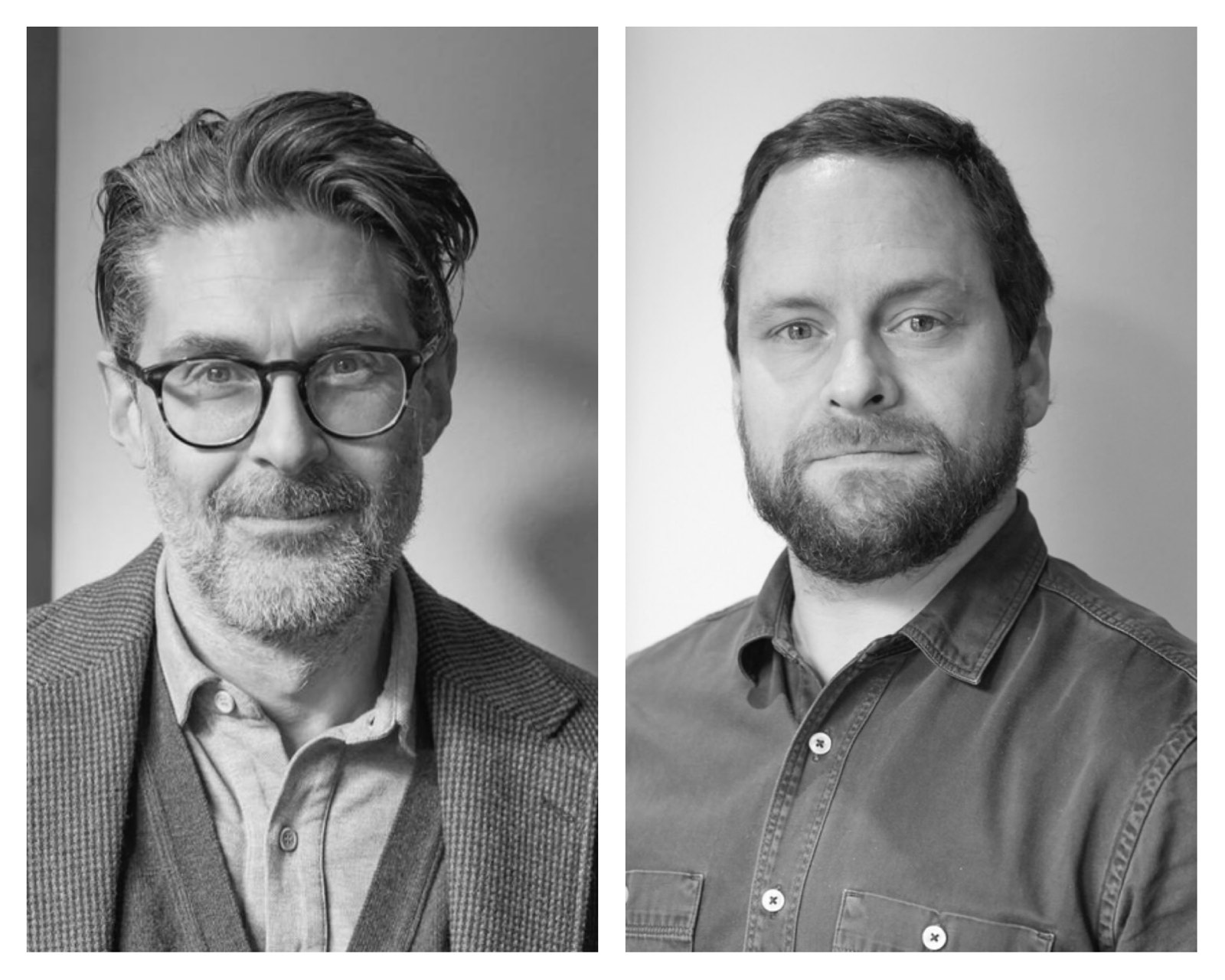
The UK and European Guild of Music Supervisors is proud to announce the appointment of Matt Biffa as the new President. He takes over from Maggie Rodford, who has been instrumental in shaping the Guild’s activities and raising its profile over the past four years.
Matt has been a music supervisor at Air-Edel for over 25 years, with his most recent projects including “Heartstopper”, “Sex Education”, “This Is Going To Hurt”, “After Life”, ‘Hacks”, “I May Destroy You”, and “The End Of The F**king World”.
In 2021 Matt, together with Ciara Elwis, won Outstanding Music Supervision at the Creative Arts Emmys for their work on Michael Coel’s BBC Drama “I May Destroy You”.
Matt is currently a member of the GMS Senior Board and Head of the Education committee.
In his new role, Matt will lead the Guild’s efforts to promote the art and craft of music supervision, support its members through the education of the value of music, the advocacy of best practice, and support for the protection of music copyright across all mediums.
“I am incredibly honoured to be appointed as the new president of the UK and European Guild of Music Supervisors, an organisation that represents the best and brightest in the world of music supervision. As the entertainment industry continues to evolve and innovate, we have seen a growing recognition of the importance of music in film, television, and other media. It is an exciting time for our field, as the world is finally catching on to what we do and the critical role we play in shaping the emotional impact of a project.
Having been a part of this industry since the mid 90’s, I have witnessed first-hand the incredible changes that have taken place over the years. From the emergence of digital streaming services that has made our work truly international to the explosion of social media, the way we approach music supervision has evolved in exciting and challenging ways. However, one thing that has remained constant is the importance of taste, knowledge, and emotional literacy in our work. As music supervisors, we must be able to understand and interpret the needs of directors, producers, and audiences alike. Our ability to curate and place the perfect music cue can make all the difference in creating a powerful and memorable moment in a project.
Having won an Emmy, I am a direct beneficiary of the Guild’s work. I owe a great debt of gratitude to the Guild and to Maggie Rodford whose experience and efforts have helped elevate the craft of music supervision to new heights.
As President of the UK and European Guild of Music Supervisors, I will be committed to elevating the role of music supervision and advocating for the recognition and respect that our work deserves. I look forward to working with my colleagues to support the growth and success of this industry, and to ensuring that the power of music continues to be felt and celebrated in all forms of media.”
In addition, the Guild also announces the appointment of Rupert Hollier as its new Vice President, taking over from Duncan Smith.
Ru is the Creative Director of Atlantic Screen Music, and of music supervision agency, Redfive, where he is also co-founder. Ru’s film and TV projects include Golden Globe, BAFTA and Oscar-nominated projects films such as “The Wife”, “The Trip and McQueen”, and also includes recent films such as “Living”, starring Bill Nighy.
Ru is co-founder and senior board member of The UK & European Guild of Music Supervisors.
“Ever since we founded the GMS in the UK in 2016, the organisation has come on leaps and bounds, and evolved into an accepted and meaningful institution that has led the charge on the issues taken up by the committees. We are about to enter a new phase, not only due to the elections but because of the sheer number of music supervisors now in the UK and Europe, the nature of evolving production needs, which increasingly changes the profile for what a music supervisor needs to both be aware of and execute on. I want to help enable and empower this next phase, support the president as much as possible at a critical time for the GMS. Similarly, on the back of my own experience in Europe with the Sync Sessions and other outreach, I would like to further support the European GMS. I believe there is yet more important work to be done with the rights holders post Covid, and also with diversity and Inclusion, amongst the other committees, and I want to be part of that process. It’s a huge honour to take on this role which I’m hugely looking forward to.”
The Guild’s outgoing President, Maggie Rodford, added:
“I would like to say a huge thank you to all the members of the Senior Board and GMS members whom I have worked closely with over the last four years. The work of the Senior and Advisory Boards is the backbone of the organisation and it is their input, together with the work of our tireless administrator, Raya Gancheva, that drives the work of the Guild forward. I look forward to supporting Matt and Rupert and to welcoming the new members of the various Boards and Committees. Exciting times ahead!”
Apart from Matt Biffa and Rupert Hollier, Senior Board members include:
Maggie Rodford, Duncan Smith, Carmen Montanez-Callan, Ed Bailie.
The Full Working Board members include:
Ben Sumner, Michelle de Vries, Chloe Heatlie, Bruce New, Claire Freeman, Dan Neale, Danny Layton, Ian Neil, Dominic Bastyra, Jacob Wheeler, Catherine Grieves, Sian Rogers, Laura Bell, Iain Cooke, Kadambari Chauhan, Tom Stanford.
The UK & European Guild of Music Supervisors is dedicated to raising awareness and understanding of the role of a music supervisor within the entertainment and media industries including film, television, gaming, advertising, trailers, interactive media and theatre. The Guild provides resources, education, and networking opportunities for its members.
There are several membership options available including:
Full Music Supervisor Membership, which requires applicants to have at least 4 years experience as a music supervisor and meet certain credit requirements
Associate Supervisor Membership, which is suitable for those working in supervision that may not yet meet the Full Supervisor criteria.
Provisional Membership, which is for individuals who are at the start of their supervision career i.e. studying a relevant course or undergoing work experience
Industry Membership, which is open to any individual or organisation directly or indirectly involved with sync
For further information, please visit:
https://www.guildofmusicsupervisors.co.uk/
GMS Diversity & Inclusion Newsletter – Arts Emergency Interview

Arts Emergency Interview
This month for our DEI newsletter interview we spoke to Arts Emergency, whose aim is to help young people get a fair start in the arts and humanities. Read on to hear more about how they are making a difference, as well as how you can get involved.
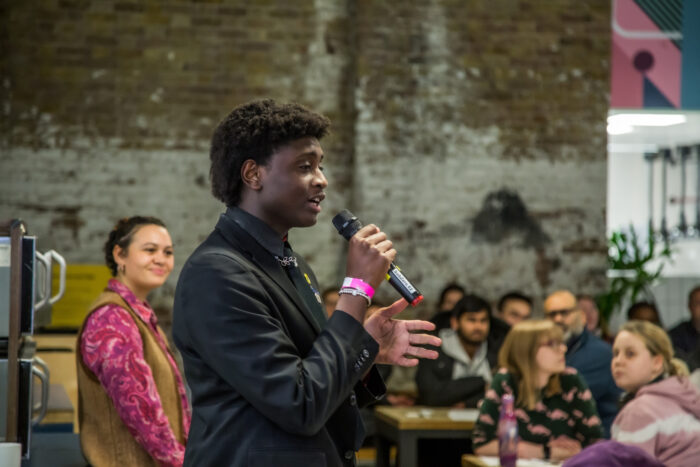
Please can you tell us a bit more about Arts Emergency and your aims?
Founded by activist Neil Griffiths and comedian Josie Long in 2013,
Arts Emergency is a social justice charity that helps young people without connections, flourish in further education and navigate their way into creative and cultural careers.
People of colour and those who are socioeconomically disadvantaged are hugely underrepresented throughout the creative industries – an industry built on the old adage “it’s not what you know, but who you know”. Arts Emergency aims to level the playing field so every young person, no matter their background, has the chance to pursue a future they want despite the barriers and the radically unfair and elitist society in which we live. Arts Emergency is tackling this issue by cultivating a network of like-minded people (over 8000 people so far) that acts as an “alternative old boy network” for the next generation of artists, activists and thinkers. By connecting this network with the young people we work with, doors into industries are opened, confidence is boosted and knowledge is shared.
What kind of programmes do you have available at AE?
Arts Emergency supports young people from the age of 16 until they’re 26 by providing mentoring, coaching, the wish list, work experience programmes, and connecting them to a network of professionals working in creative industries. Through partnerships with venues it also offers free tickets to cultural events, a chance to talk to people working in a career that they’re interested in and exclusive paid work opportunities.
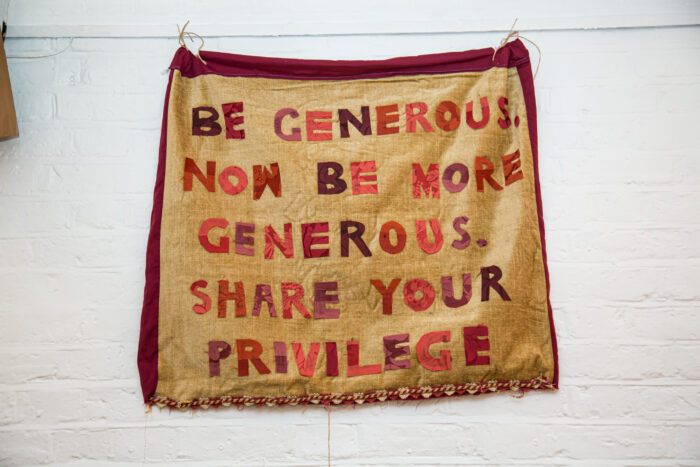
What would you say are the biggest barriers you see from young people trying to enter the arts / music?
The cuts to art subjects in the school curriculum means that learning an instrument is dependent on your postcode and family’s financial circumstances. A lot of the young people we speak to who are passionate about a career in music have said they’re learning how to do musical production using apps, but they’re unsure of whether their DIY know-how is enough to have them consider further education or applying for jobs in the music industry. There’s an expectation that young people will work for free so it’s always those whose circumstances make this impossible who miss out on opportunities. Also, the creative industry often recruit from within their existing networks, basing their decisions on word-of-mouth rather than opening up the process for everyone to get a fair shot.
How can we counter those barriers?
Aside from lobbying the government to end cuts to art subjects, effective ways to counter the barriers are; opening up doors to the industry to the least represented and most underprivileged young people, offering subsidised music workshops, lessons, instrument hire, paid work experience, internships and fairly paid entry level positions.
How can our members in the music industry get involved with AE?
The first step for members of the music industry to get involved with Arts Emergency is to Join the Network! The Network really is the core of Arts Emergency. It’s a fantastic community of people who are passionate about arts and culture. They believe in a fairer future and share the view that the arts are richer when they represent diverse voices. Through a monthly newsletter Network members hear about what the organisation is getting up to, what programmes it’s recruiting for and what its young people need advice on. In autumn we’ll be recruiting for mentors so join the Network and be the first to hear when recruitment opens.
The second step would be to help grow the movement by telling your friends and your industry networks and by fundraising for the organisation. Next, you could consider if you can spare £5 a month and set-up a monthly donation – regular donations like this contribute massively to the effective running of our programmes. And lastly, sharing news about Arts Emergency on your social media will help spread the word even further!

GMS Diversity & Inclusion Newsletter – GMS Internship Pilot: Filipa Borges Interview
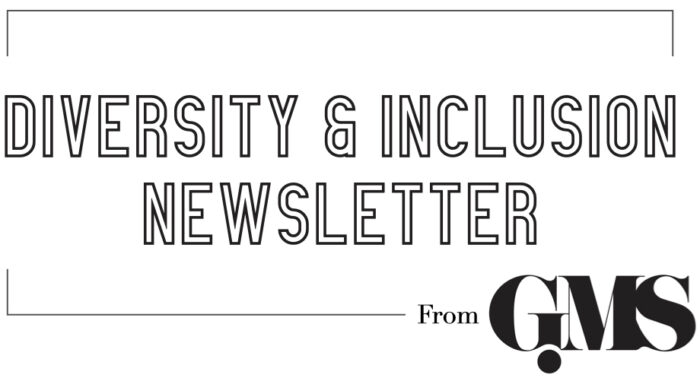
GMS Internship Pilot: Filipa Borges Interview
This month for our newsletter, we interviewed Filipa Borges who took part in the GMS Internship pilot, spending 6 months with the sync team at Globe, who financially supported the full 12 month term of the pilot at London Living Wage, before joining Leland Music for another 6 months.
She speaks to us about her involvement in the pilot, the differences between working for a major rights holder and a music supervision company, and her plans for the future.
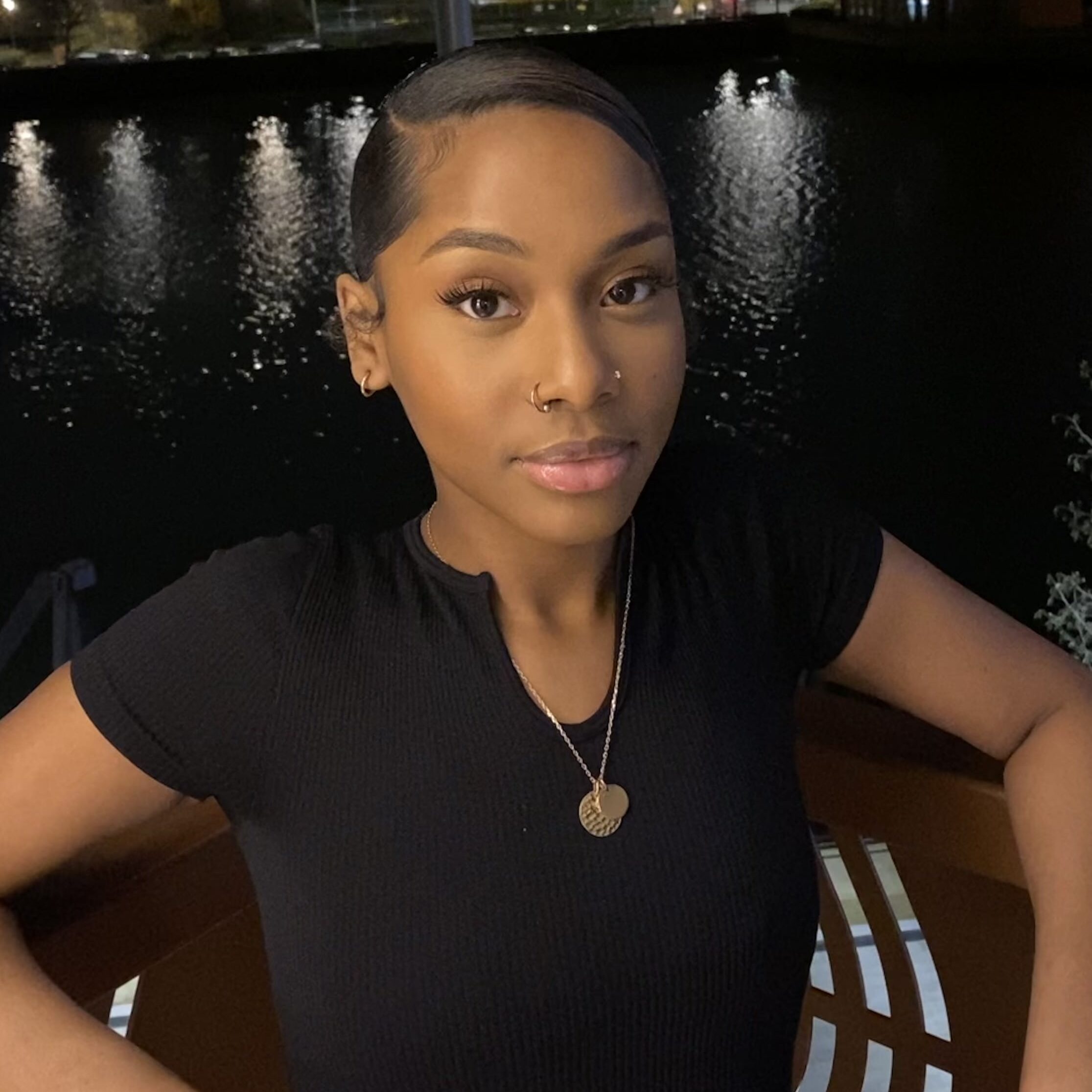
What motivated you to apply for the GMS internship pilot?
I just had my daughter in January last year and so I was still in uni and juggling things, but I didn’t really enjoy my course and I was trying to figure out what I was going to do afterwards. Corporate is not really for me, I believe. So I gravitated towards the music industry, already having an interest because I went to ELAM. I was still getting emails from them as there’s an alumni email system where we still get job alerts.
And then this kind of popped up. I don’t know why it interested me, but then I did more research into it. I was like, “OK, this is something I can get behind”. I feel like my motivation was more so because I wanted to do something that I loved and not just for the sake of money or stability. I wanted to do something I was actually interested in.
Did you know much about sync before? Did you have any expectations?
The word kind of frightened me because I wasn’t aware of what it was. I knew of “synchronisation” but not much about the role at all. I guess going into it, not knowing too much about sync, I didn’t really have any [expectations]. I watched some videos on the role of a music supervisor, though a lot of them were based in America, but that kind of broke it down a bit more.
How did you find the application process?
It was hard finding the time to do it as my daughter was around so what was most difficult was just finding time to do it! I tried to get support from people around me that were more familiar with the process of applying for jobs like this. So I had people helping me, prep for interviews and stuff like that. It was my first proper industry role, I always just did retail before.
Did you find that your time in retail or other previous experience gave you skills that were transferable to sync? How did you think that helped you?
I was kind of shy then, so working in retail was initially hard for me but I learned a lot of things like paying attention to detail and I feel like my organisational skills improved. So in a way, I guess some of it helped.
We know that no two days are the same, but we’d love you to talk through your average day at Globe.
I would start my day by checking my emails and seeing what’s urgent, such as a music supervisor who needed audio ASAP, so I’d try to get the MP3s and the WAVs to them, whatever they needed. Replying to clients and telling them where the project is at in terms of approval. We’d also listen to new music on a Thursday and give feedback on what could work for certain projects. We’d also have social meetings on Wednesdays where we would discuss how to keep audience engagement with certain projects. There was also a lot of admin, like helping with licences and updating newsletters and calendars which I actually really enjoyed in the end.
How did your time at Leland compare to your time at Globe?
Initially there was a lot of training. It’s really focused on me being given an introduction to music supervision and giving me information that I may not have known before.
And DISCO. Oh my goodness, DISCO organisation can be overwhelming, but when the correct metadata and tags are added, playlists are easier to find and so it’s a bit less overwhelming. So whenever we had briefs, I’d help with the playlist and gather information on previous usage to make sure that the brands are happy.
We’d also have meetings to catch up on where we’re at and what we need more support on as a team. I’d also give my opinion on the newsletter content, helping to make sure that we have good reach with people and keep up a connection with clients. I really enjoyed seeing the way that everyone at Leland connects and builds relationships. There’s always a coffee in the calendar. You end up really personalising the relationships with the people that you work with.
What were some of the differences you observed between working for a rights holder and then working for a music supervisor?
[At Globe] I had to get used to being in such a big environment, especially after being in lockdown when I was a stay at home mum and not around a lot of people. I ended up speaking to people on different floors as well and there was lots of collaboration between different labels. At Leland, it was a smaller team but I really enjoyed that as well because I feel like you can get more 1:1 time with a lot of people, so it makes for a more personalised experience.
What have you found most challenging in terms of the work but also as part of the pilot as a whole?
It’s been very hard juggling it with being a new parent, but it’s been worth it at the same time. I’ve learned a lot about time management and just preparing myself for the work day. I’ve had really good conversations with everyone in terms of how they’ve been able to get through their challenges. So I haven’t had too many times where I’ve been without advice, I wasn’t left in the dark.
Sometimes I do get imposter syndrome and sometimes you really have to motivate yourself. I’ve started writing down the things that I’ve been able to do so far though which has helped me find the areas that I may have gaps in. You really have to be someone who’s proactive and driven.
What’s been the most rewarding part of this process?
I think finding people that I still talk to now. At Globe, there’s Renee (Creative Licensing Coordinator – Film, TV & Games) – she was amazing. She’d help me out even with minor things. So I think building connections that exist outside of work has been a highlight. I would also say a highlight at Leland has been me being able to bring my existing skill set over and develop it. They’re all super open with advice and keen to help me get further.
What are your views on diversity within the sync community? What do you think our community does well and what do you think could be better?
When I first did my interviews, I was really happy to see that two Black women were interviewing me because I’d never had that before. I was a bit scared going into it and I didn’t want to expect anything so I went in with an open mind. Seeing Renee and Ricole (Creative Sync – A&R Manager, Globe) on the team made me feel a lot more comfortable because I feel like seeing yourself in these spaces does really help. And not just that, but also being able to talk to them and share experiences. I definitely want to keep advocating for people who look like me to get into these spaces.
I do feel like there’s more that can be done for parents, especially younger ones. There are a lot of young parents who are put off from pursuing what they want to do because a lot of industries don’t really promote what support is available.
Do you have any general advice for future applicants?
Don’t think that you know everything based on the research you’ve done. I said it in my interview too – at all stages of your life, you’re a student and there’s nothing that you can’t learn. Be open to all the information that’s around you. What an exec says is not more important than what somebody beside you says – every point is valid. So be respectful to everybody at every level and network across.
Keep track of the things that you’re learning, it’s so important. But also keep track of what you have knowledge of. Ask all the questions that you need answers to, whether you think they’re silly or just blatantly obvious.
Lastly, I’d say, enjoy the internship and take advantage of your surroundings by putting yourself forward for opportunities.
What’s next on the cards for you?
I’m going to Manchester. I don’t necessarily have anything lined up yet, but I’m hoping to still be involved in music there. I’m hoping to connect more with people who are in and around the music community there. If something that I want to do is not available, I’ll not let that discourage me, but my aim is to just keep building community and helping in any way that I can.
What You Can Do
If you are a sync department or music supervisor and are interested in taking part in running a GMS Internship program or if you’d like to connect with Filipa, please email diversityandinclusion@guildofmusicsupervisors.co.uk
The UK and European Guild of Music Supervisors
